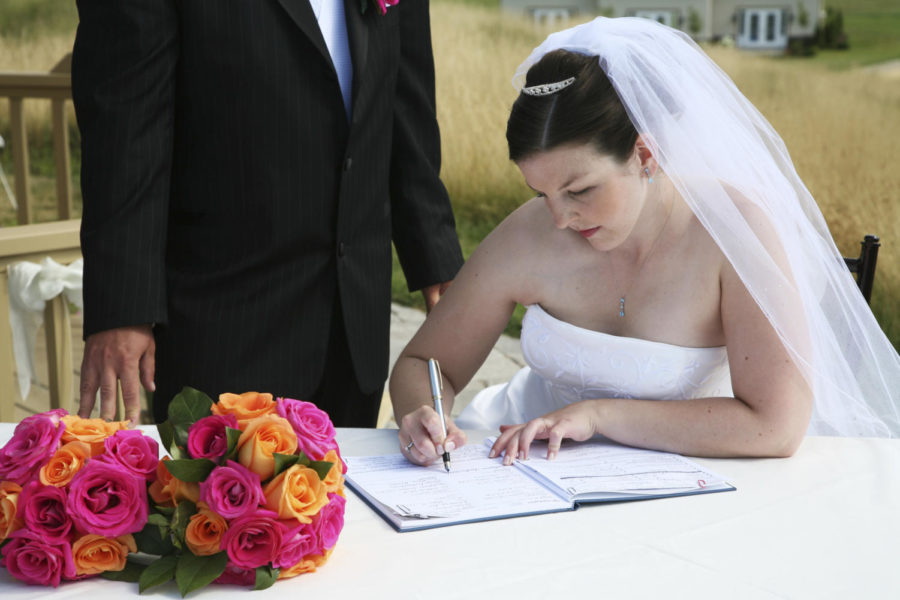Last names first
Bride signing marriage certificate
March 25, 2015
After the “I do’s” are said and the rings are exchanged in a traditional wedding, it is most common that the bride will leave the ceremony with a new last name. That tradition is transitioning as times continue to change and more women are standing their ground when it comes to their last names.
As women are becoming more independent, it is more common for them to keep their maiden name after marriage. Although previous generations typically followed the tradition of women taking their husband’s name, times are changing.
Journalism professor Lisa Munger Oakes got married in 2011 and said her parents had no expectations when it came to changing her last name.
“I think my parents, if anything, expected that I wouldn’t change my name, and I didn’t initially,” Munger Oakes said. “I was already Lisa Munger for a long time and that’s how I thought of myself.”
Timing can play a role in the decision making as well. Someone getting married right after graduating from college may have no problem changing their name. However, someone getting married after working for a couple of years and attaining success under their name may have a harder time making the change.
“I got married a little later in life as compared to what some people do,” Munger Oakes said. “As a journalist, I had already developed professional relationships and clips as Lisa Munger.”
Whether the couple has kids already or they’re just part of the plan, the children can cause new name-changing decisions.
“I kept my maiden name until last summer,” Munger Oakes said. “I had twins last summer. When I had the babies, I added my husband’s last name to mine to make it Munger Oakes. We decided to have the babies last name be Oakes rather than saddle them with two last names because we felt like that was a lot, but I wanted to have the same last name as they did.”
Bradley Meyer, junior in family and consumer science, said he looks forward to the future when he can have a husband and kids. He has already put thought into how he would like last names to appear.
“I have considered a lot of possibilities, especially since I do want to have children,” Meyer said. “Ultimately I would like to hyphenate our two names and pass that on to any children.”
In same-sex couples, there can often times be rough relationships between the couple and each person’s respective parents, Meyer said. This can be a contributing factor when beginning to discuss name possibilities after marriage.
“Some people want to get away from that connection to their family, but some people really love their family and want to keep that association,” Meyer said. “I would like to hyphenate the names, not only because it keeps both of our families as a part of our marriage but it is more symbolic of a union of two people.”
Of course this is a decision both members of the relationship need to be a part of, and while some people are more flexible than others, a unanimous decision is important.
For Sarah Greesonbach, formally Sarah Marbach, on theeverygirl.com, taking her husband’s last name, Greeson, was not an option, nor was hyphenating the two of them. She needed another option.
By the time marriage came for Sarah and her then-boyfriend, they were both into their 20s, each with a bachelor’s and master’s degree and multiple years of professional experience behind them.
“It only felt right to combine our names the way we were combining our lives,” Greesonbach said. “For some women, taking her husband’s name feels natural and right. For others, they were born knowing they would hyphenate. For me, I knew the right name when I saw it.”
There is no longer an expectation when it comes to last name changes, or lack thereof, after marriage. It is a choice the couple needs to make together, and one both can live with for the rest of their life.
“In the end, do what feels right to you, and only you,” Munger Oakes said. “Whatever you choose, when you hear the name, it has to feel like you.”







